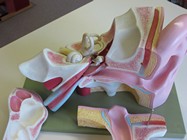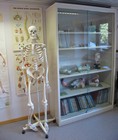Centre de Documentation Gilly / CePaS-Centre du Patrimoine Santé
HORAIRE
Lu : 8h15 à 12h00 - 12h30 à 16h15
Ma : 8h15 à 12h00 - 12h30 à 16h30
Me : 8h15 à 12h00 - 12h30 à 16h15
Je : 8h15 à 12h00 - 12h30 à 16h30
Ve : 8h15 à 12h00 - 12h30 à 16h15
La bibliothèque sera ouverte le lundi 2 juin de 10.30 à 17.45
La bibliothèque sera fermée les mardi 10 et lundi 23 juin. Les locaux 140 et 240 seront, comme habituellement, ouverts pour vous y accueillir pour étudier.
Lu : 8h15 à 12h00 - 12h30 à 16h15
Ma : 8h15 à 12h00 - 12h30 à 16h30
Me : 8h15 à 12h00 - 12h30 à 16h15
Je : 8h15 à 12h00 - 12h30 à 16h30
Ve : 8h15 à 12h00 - 12h30 à 16h15
La bibliothèque sera ouverte le lundi 2 juin de 10.30 à 17.45
La bibliothèque sera fermée les mardi 10 et lundi 23 juin. Les locaux 140 et 240 seront, comme habituellement, ouverts pour vous y accueillir pour étudier.
Bienvenue sur le catalogue du
Centre de documentation de la HELHa-Gilly
et du CePaS - Centre du Patrimoine Santé
Centre de documentation de la HELHa-Gilly
et du CePaS - Centre du Patrimoine Santé
Détail de l'auteur
Auteur H.J. Aubin |
Documents disponibles écrits par cet auteur


 Ajouter le résultat dans votre panier Faire une suggestion Affiner la recherche
Ajouter le résultat dans votre panier Faire une suggestion Affiner la rechercheStratégies actuelles de prise en charge des troubles de l'alcoolisation / H.J. Aubin ; A. Benyamina ; L. Karila ; A. Luquiens ; M. Reynaud in La revue du praticien, Tome 61, n°10 (Décembre 2011)
Titre : Stratégies actuelles de prise en charge des troubles de l'alcoolisation Titre original : (Current strategies for treatment of alcohol problems) Type de document : texte imprimé Auteurs : H.J. Aubin ; A. Benyamina ; L. Karila ; A. Luquiens ; M. Reynaud Année de publication : 2011 Article en page(s) : 1373-1377 Langues : Français (fre) Mots-clés : ALCOHOL ALCOOL MANAGED CARE PRISE EN CHARGE BRIEF INTERVENTION INTERVENTION BREVE METHOD METHODE ALCOHOLIC ALCOOLIQUE ACCOMPANYING ACCOMPAGNEMENT PHARMACOTHERAPY PHARMACOTHERAPIE ALCOHOL WITHDRAWAL SYNDROME SYNDROME DE SEVRAGE ALCOOLIQUE NALTREXONE ACAMPROSATE DISULFIRAM RESIDENTIAL TREATMENT TRAITEMENT RESIDENTIEL Résumé : FRANÇAIS :
Parmi les approches psychologiques ayant montré leur efficacité, l'intervention brève est particulièrement adaptée à la prise en charge en médecine générale. Elle vise à accroître la motivation au changement des patients après le repérage d'une consommation excessive d'alcool. Pour un patient alcoolodépendant désirant s'engager vers l'abstinence, le traitement pharmacologique est d'abord constitué d'une période, brève, de sevrage, à l'aide de benzodiazépines en cas de syndrome de sevrage cliniquement significatif. Il est ensuite représenté par la prévention de la rechute, pour laquelle il n'existe toujours que trois médicaments validés, l'acamprosate, la naltrexone et le disulfirame.
ENGLISH:
Amongst validated psychological treatments, brief intervention appears to be the best suited for primary care. It aims at increasing motivation for change after a screening for an alcohol use disorder. The first therapeutic step for an alcohol-dependent patient aiming at abstinence is alcohol detoxification. At this stage, benzodiazepines should be briefly prescribed if the patient manifests clinically significant withdrawal symptoms. The next step is relapse prevention, for which only three medications are currently validated in France, acamprosate, naltrexone, and disulfiram.Permalink : http://cdocs.helha.be/pmbgilly/opac_css/index.php?lvl=notice_display&id=25977
in La revue du praticien > Tome 61, n°10 (Décembre 2011) . - 1373-1377[article] Stratégies actuelles de prise en charge des troubles de l'alcoolisation = (Current strategies for treatment of alcohol problems) [texte imprimé] / H.J. Aubin ; A. Benyamina ; L. Karila ; A. Luquiens ; M. Reynaud . - 2011 . - 1373-1377.
Langues : Français (fre)
in La revue du praticien > Tome 61, n°10 (Décembre 2011) . - 1373-1377
Mots-clés : ALCOHOL ALCOOL MANAGED CARE PRISE EN CHARGE BRIEF INTERVENTION INTERVENTION BREVE METHOD METHODE ALCOHOLIC ALCOOLIQUE ACCOMPANYING ACCOMPAGNEMENT PHARMACOTHERAPY PHARMACOTHERAPIE ALCOHOL WITHDRAWAL SYNDROME SYNDROME DE SEVRAGE ALCOOLIQUE NALTREXONE ACAMPROSATE DISULFIRAM RESIDENTIAL TREATMENT TRAITEMENT RESIDENTIEL Résumé : FRANÇAIS :
Parmi les approches psychologiques ayant montré leur efficacité, l'intervention brève est particulièrement adaptée à la prise en charge en médecine générale. Elle vise à accroître la motivation au changement des patients après le repérage d'une consommation excessive d'alcool. Pour un patient alcoolodépendant désirant s'engager vers l'abstinence, le traitement pharmacologique est d'abord constitué d'une période, brève, de sevrage, à l'aide de benzodiazépines en cas de syndrome de sevrage cliniquement significatif. Il est ensuite représenté par la prévention de la rechute, pour laquelle il n'existe toujours que trois médicaments validés, l'acamprosate, la naltrexone et le disulfirame.
ENGLISH:
Amongst validated psychological treatments, brief intervention appears to be the best suited for primary care. It aims at increasing motivation for change after a screening for an alcohol use disorder. The first therapeutic step for an alcohol-dependent patient aiming at abstinence is alcohol detoxification. At this stage, benzodiazepines should be briefly prescribed if the patient manifests clinically significant withdrawal symptoms. The next step is relapse prevention, for which only three medications are currently validated in France, acamprosate, naltrexone, and disulfiram.Permalink : http://cdocs.helha.be/pmbgilly/opac_css/index.php?lvl=notice_display&id=25977 Exemplaires (1)
Cote Support Localisation Section Disponibilité Revue Revue Centre de documentation HELHa paramédical Gilly Salle de lecture - Réserve Exclu du prêt










